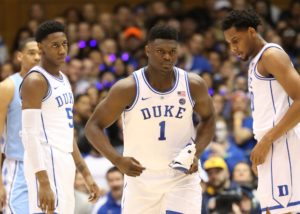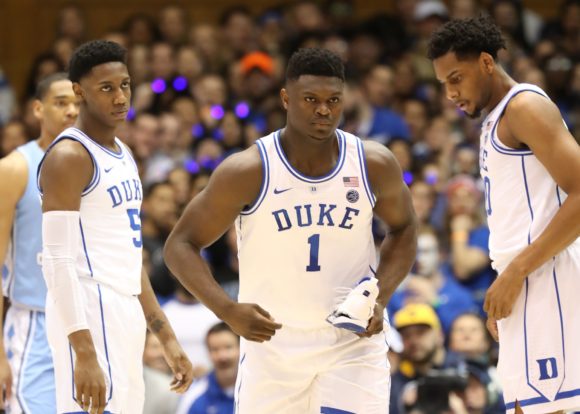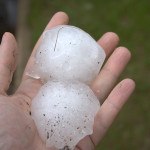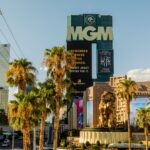The high-profile failure of a Nike Inc. basketball shoe on Wednesday night was more than an epic embarrassment for the athletic brand. It could be a product-liability case.
Duke University star freshman Zion Williamson — the consensus No. 1 pick in this year’s National Basketball Association draft — sprained his knee when his Nike sneaker fell apart. He tumbled to the court less than 35 seconds into the loss to in-state rival North Carolina.
The incident suggests that Nike could be liable, said Paul Edelstein, a lawyer at Edelsteins Faegenburg & Brown in New York. He represents athletes in brain injury and other sports-related litigation.
“This would be a classic product-liability case if Mr. Williamson suffered any type of serious injury and was inclined to bring one,” Edelstein said. “This product was specifically designed to provide support for athletes such as him and clearly failed.”
The injury happened after Williamson planted his foot to change direction. His left shoe, Nike’s PG 2.5 PE, came apart, causing him to fall awkwardly.
The fallout for the world’s largest sportswear brand was immediate. Twitter lit up with jabs from fans and rival brands, making “Zion” and “Nike” trending topics within the social-media network. The company’s stock fell as much as 1.8 percent in New York trading Thursday.
“We are obviously concerned and want to wish Zion a speedy recovery,” Nike said by email. “While this is an isolated occurrence, we are working to identify the issue.”
Basketball Dominance
The question now is whether the incident will hurt Nike’s prominent standing within the sport. That’s unlikely, according to Bloomberg Intelligence analyst Chen Grazutis. If you combine Nike and its Jordan brand, the company has more than 90 percent of the basketball market. Nike reported $4.35 billion in wholesale equivalent basketball sales in fiscal 2018, about 14 percent of its overall sales.

“They might get a lot bad press over the next couple days, but I don’t think it will have a direct impact on the shoes,” Grazutis said.
Legally, though, there still could be fallout. Although Duke officials reported that Williamson suffered only a mild knee sprain, that doesn’t necessarily get Nike off the hook, Edelstein said.
Unless there’s proof that the shoe was misused or damaged after it left the factory, Williamson has a good case, he said. The situation isn’t “any different than a laborer climbing a ladder that suddenly collapsed under his weight,” Edelstein said.
Exclusive Rights
Companies like Nike and Adidas pay tens of millions of dollars for the exclusive right to outfit high-profile college programs like Duke, meaning their athletes are required to wear uniforms and shoes made by the team’s sponsor. Though Duke’s contract with Nike isn’t public, the Durham school is one of Nike’s most important basketball partners. For comparison, the University of Kentucky, another top basketball school, extended its Nike deal a few years ago for eight years and $30.6 million.
The malfunction might also hurt Nike’s ability to sign Williamson once he decides to go pro. College athletes can’t sign endorsement deals, but competition for elite draft prospects is fierce every year. Last year’s No. 1 pick, Deandre Ayton, signed a deal with Puma SE that was reported to be the largest rookie deal since Kevin Durant’s seven-year, $60 million deal with Nike back in 2007.
Williamson is one of the most highly regarded college prospects in years. The 6-foot-7, 285-pound forward suffered a mild knee sprain, according to Duke coach Mike Krzyzewski. He did not return to the game, and No. 8 UNC upset No. 1 Duke 88-72.
The timing could not have been worse for Nike. Not only was the game televised nationally on ESPN, it was one of the most anticipated college basketball games of the year. The cheapest resale tickets leading up to tipoff were over $2,500, approaching Super Bowl levels.
Former President Barack Obama, courtside at the high-profile clash, was shown on video appearing to say with an incredulous look: “His shoe broke!”
It also comes as Nike draws criticism for a different kind of shoe malfunction. Some people who purchased the company’s newest basketball creation, a laceless shoe that you can control with your phone, were unable to connect to the Android version of the app.
This isn’t the first time that Nike’s had problems with its basketball merchandise. After taking over as the official NBA uniform supplier in 2017, stars such as LeBron James had their jerseys rip.
Nike stock is up about 25 percent in the past year, similar to the gains of Puma and Under Armour Inc. while leading the roughly 12 percent gain of Adidas AG.
Puma is an upstart in the basketball market, and one of its few NBA players, Terry Rozier of the Boston Celtics, took advantage of Nike’s stumble to urge others to join him.
Was this article valuable?
Here are more articles you may enjoy.


 CoreLogic Report Probes Evolving Severe Convective Storm Risk Landscape
CoreLogic Report Probes Evolving Severe Convective Storm Risk Landscape  EVs Head for Junkyard as Mechanic Shortage Inflates Repair Costs
EVs Head for Junkyard as Mechanic Shortage Inflates Repair Costs  MGM Resorts Sues US FTC to Stop Investigation of Casino Hack
MGM Resorts Sues US FTC to Stop Investigation of Casino Hack  Viewpoint: How Generative AI Enables a Brighter Claims Future in 2024 and Beyond
Viewpoint: How Generative AI Enables a Brighter Claims Future in 2024 and Beyond 